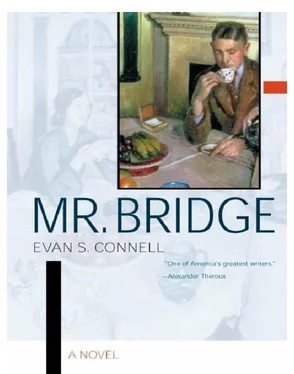Later that evening Mr. Bridge wandered restlessly around the bedroom while his wife sat at the dressing table stroking her face with cold cream.
“I didn’t realize she had a nephew that old,” he said. “The boy must be nearly the same age she is.”
“Not quite. Harriet looks younger than she is. She’s twenty-four or twenty-five, if I’m not mistaken,” Mrs. Bridge answered thoughtfully. “Of course, I suppose her sister could be any age.”
“There are plenty of decent colored schools.”
“Yes, I imagine,” she said, dipping her fingers into the jar of cream.
“Why doesn’t the boy pick one of those schools? Why the devil does he want to go to Harvard?”
“Goodness, I’m not the person to ask,” she replied. She continued stroking the cream on her face. “But it’s hardly a mystery. Harvard is such a fine school.”
“It is a fine school. A very fine school. It’s a very fine school indeed.”
Because of his tone she paused. She glanced at him in the mirror. “If Harriet’s nephew wishes to attend Harvard don’t you think he has every right to?”
“Junior Dewes, or whatever his name is, has the right to apply for admission. He does not necessarily have the ‘right’ to attend Harvard.”
“Well,” she said, “of course, it isn’t up to me. I haven’t the faintest idea whether or not they’re going to accept him. I suppose that’s up to the Board of Trustees, or whoever makes these decisions.”
“If you want my opinion, that boy is asking for trouble. Why does he want to attend Harvard? There have been any number of Negroes who became respected, influential men without going to a white school. Look at George Washington Carver! Look at Booker T. Washington! Lord, these men managed to get a fine education without doing what this boy in Cleveland wants to do.”
She paused again, watching him in the mirror, and finally said, “I had no idea this would upset you so. I wouldn’t have brought up the subject.”
“No good will come of it,” he said as he paced the bedroom pulling at the tassels of his robe.
Under the impression that his name must be Solomon, Mrs. Bridge brought him a family argument to settle. At considerable length she explained what had happened; even so it was confusing. As nearly as he could discover, Carolyn, without asking permission, had taken a pair of scissors and had clipped a number of pictures out of Ruth’s high school annual. Five pictures. Five pictures of one boy. Being presented with the evidence he studied it: five rectangular photographs about the size of a postage stamp featuring a plump, mealy-faced youth with prominent ears and a foxy grin whose name was Hayden Seitz. In each photograph Hayden Seitz was grinning. As Mr. Bridge pondered this example of his daughter’s taste in young men he began to feel depressed. It was doubtful if a less promising specimen could be found anywhere in the album. All the same, she was infatuated; there was no question of this, because she had mutilated Ruth’s book. Ruth was in a rage, having slapped her younger sister; now Carolyn was crying but she too was enraged, not only because of the slap and because Ruth had grabbed her by the hair but because, as Mrs. Bridge explained, not satisfied with hair-pulling and slapping, Ruth had called Carolyn “a dreadful name.” So there was chaos and disorder in the house, as there had been once before when the girls could not abide each other, and he was expected to do whatever ought to be done. It was that simple.
The phrase his wife had used made him curious, though under the circumstances only two or three names seemed likely. He thought about inquiring, but decided not to. After all, the name was irrelevant. What was relevant was that it was dreadful; and from this description he concluded that his wife did not intend to repeat the word aloud. So, with the idea that sometime in the future when all of this had been settled and nearly forgotten he might ask Ruth just exactly what she had called Carolyn, he rocked around in his swivel chair and deliberated. What he must decide was which of them should be punished, and how, or whether both of them deserved punishment. There seemed to be no way out of the situation. His wife had not been able to handle it, and now, because she had let the girls know that she was going to tell their father, they were waiting to see what he would do.
He asked where they were. They were standing in the hall just outside the study. They were not speaking to each other. Carolyn was sniffling. They were waiting to be admitted, each confident of vindication and looking forward to the other’s punishment.
Having ordered them brought into the study, he listened to two more accounts of the atrocity committed by Carolyn and the vengeance exacted by Ruth, after which he announced that he did not intend to punish either of them, because they had punished themselves. This thought had come to him while he was listening to their stories, and it pleased him. No doubt Solomon could have done better, but on the whole it was not bad. Not bad at all.
The girls gazed at him doubtfully. They had not expected this. Their case had been carried to the supreme authority in the expectation of a decision which they might accept, or which they might appeal. But the supreme authority had refused to accommodate them: he had returned their sins to them, and the contemplation thereof. They were not sure if they approved of this.
Mr. Bridge in his swivel chair, rocking back and forth while his fingers formed a steeple beneath his chin, regarding his truculent, unsatisfied daughters, experienced a moment of epiphany. He had supposed he was being no more than clever, he had thought he was merely extricating himself from an uncomfortable situation when he returned their wrongdoing to them. Instead, he had touched a truth half buried like a root in his path, stumbling over it — the futility of punishment. But at once his instant of enlightenment lay in ashes while logic reasserted itself, pointing out that from the beginning we have believed in punishment, we have ordained it, therefore this precept of society must be valid.
So the vision came but then was gone, and he found himself troubled by a problem far exceeding that of his quarreling daughters.
Most of the radio programs he enjoyed were conveniently scheduled on Saturday and Sunday evening: Jack Benny, George Burns and Gracie Allen, “Gang Busters,” “The Chase and Sanborn Hour” with Don Ameche and Edgar Bergen, “Amos ’n Andy,” “The Kraft Music Hall” with John Scott Trotter’s orchestra and Bing Crosby, and “The American Album of Familiar Music” starring Frank Munn. If he and Mrs. Bridge had been invited out, he felt mildly resentful because there was nothing he liked better than to relax in the living room after dinner while listening to this familiar and reassuring cycle of programs. Each week there were guest artists: Grace Moore, Deanna Durbin, James Melton, Dennis Day, Jessica Dragonette, Lanny Ross, Rosa Ponselle, John Charles Thomas, Lawrence Tibbett — and he enjoyed them all. They sang “Bendemeer’s Stream” and “Isle of Capri” and “Ave Maria” and selections from the famous operettas such as Blossom Time, The Desert Song, Naughty Marietta, The Chocolate Soldier, Roberta, The Vagabond King, and Sweethearts. And of all the programs the one he liked best was “The Bell Telephone Hour,” where he could usually count on hearing Nelson Eddy. He thought, and often remarked, that Nelson Eddy had the finest voice he had ever heard. Indeed, “The Bell Telephone Hour” was so gratifying that at times he had difficulty concealing the emotion he felt.
Читать дальше












